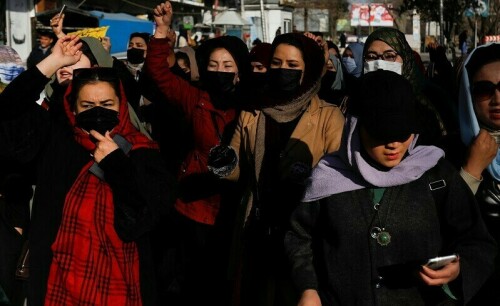KABUL: Afghanistan’s supreme leader on Saturday urged Afghans to respect sharia law and called for good relations with the international community, in a rare message marking the end of Ramazan.
In a written message ahead of Eidul Fitr, supreme leader Hibatullah Akhundzada said: “Injustice and being opposed to Sharia leads to insecurity.”
Since returning to power in August 2021, the Taliban authorities have enforced rules based on a strict interpretation of Islamic law. Women have borne the brunt of restrictions the United Nations has labelled “gender apartheid” that have pushed them from public life.
The Taliban government has not been officially recognised by any state and Hibatullah’s message did not touch on key diplomatic sticking points, such as allowing girls and women to return to secondary schools and universities.
In a rare message ahead of Eid, Akhundzada urges Afghans to respect sharia
Hibatullah, who lives in southern Kandahar province — the Taliban’s spiritual heartland — and is rarely seen in public, reiterated that the Taliban authorities “seek diplomatic and economic relations with all nations”.
“In the realm of international relations among all countries, we aim to pursue a balanced and economically focused policy in the light of the holy religion of Islam.”
The Eid message came after a recording attributed to Hibatullah that circulated in January was shared widely again in recent weeks.
In that audio clip, he vowed to implement punishments used under the Taliban’s previous rule from 1996 to 2001, such as public stoning of women for adultery, sparking condemnation from rights groups and the United Nations.
In a recent interview with Afghanistan’s Tolo News, Taliban government spokesman Zabihullah Mujahid said stoning was part of sharia law and that it would be used again “if the conditions for it arise”.
The Taliban authorities have not officially commented on the audio clip.
During the Taliban’s first rule, public executions were common, with only a handful carried out since their return to power.
Corporal punishment — mainly flogging — has been common, however, and employed for crimes including theft, adultery and alcohol consumption.
On Wednesday, five men and a woman were publicly flogged over charges of “adultery and sodomy” in eastern Logar province, the supreme court said in a statement.
Published in Dawn, April 7th, 2024













































Dear visitor, the comments section is undergoing an overhaul and will return soon.